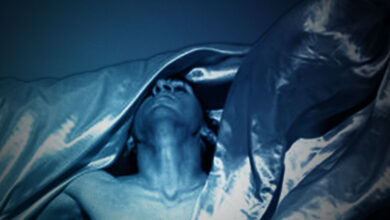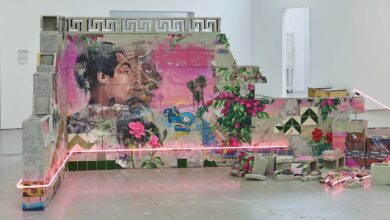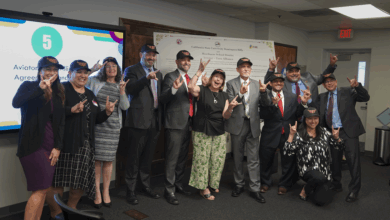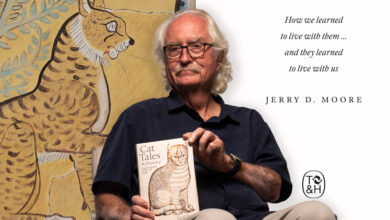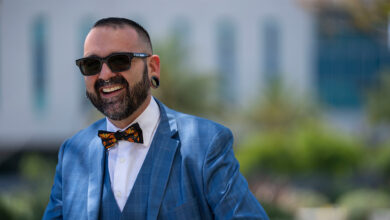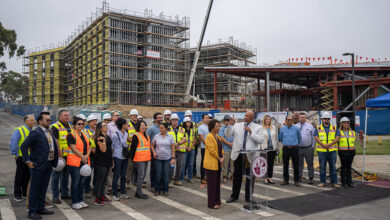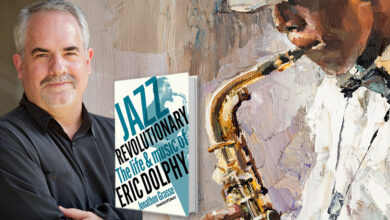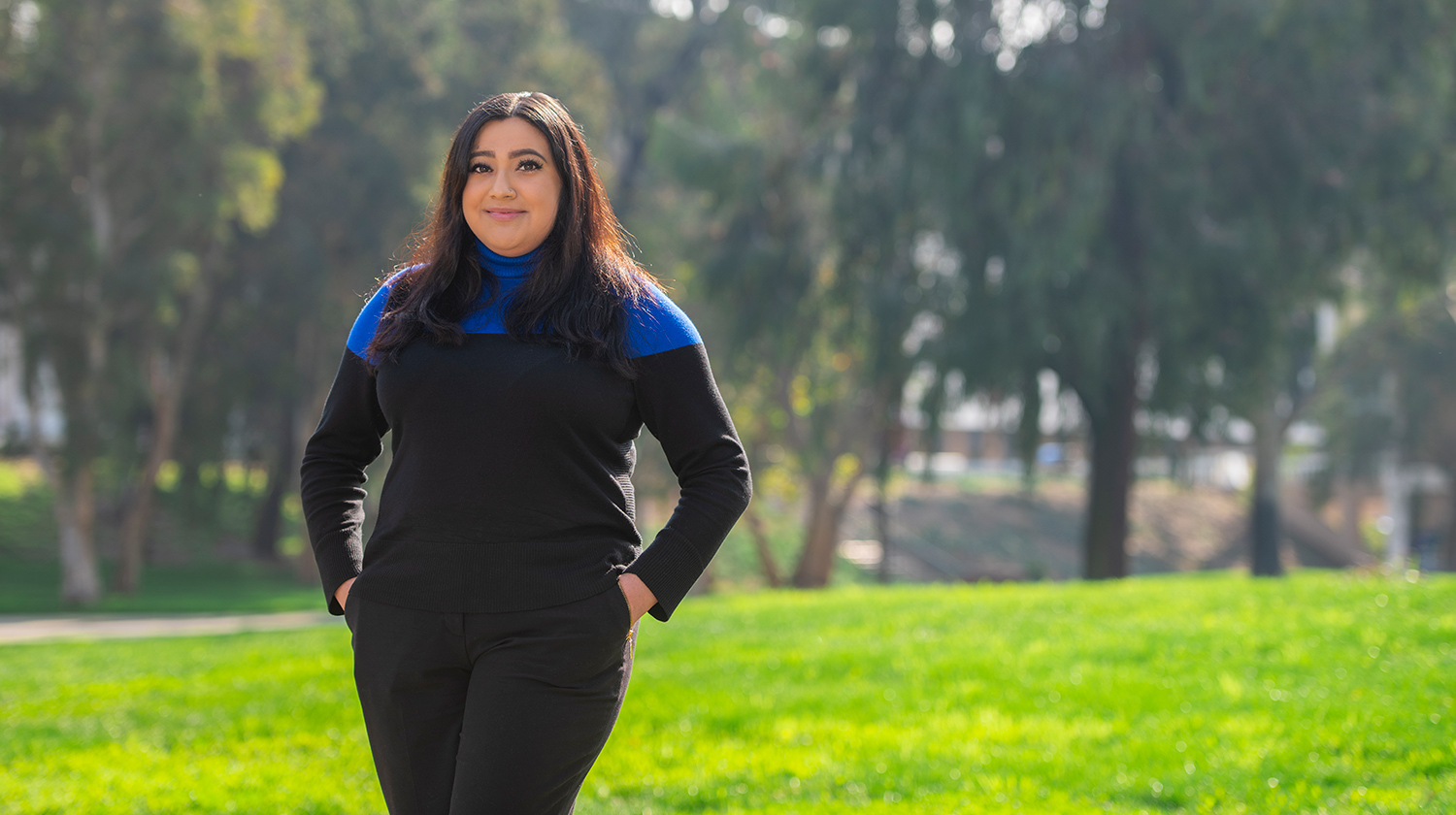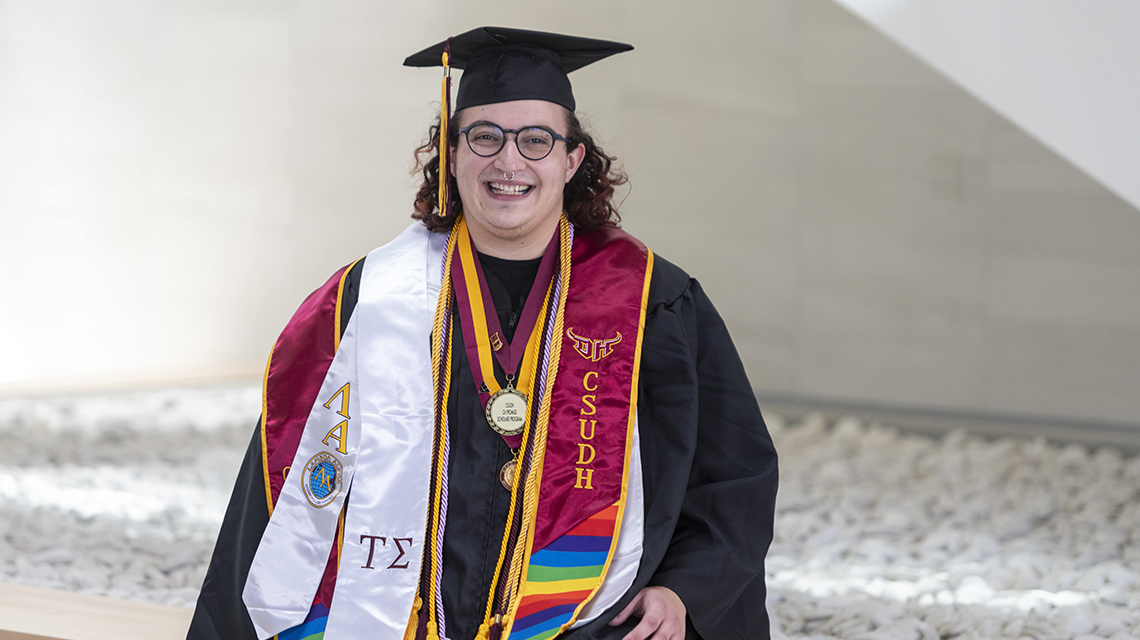
The CSUDH Class of 2022 has had many obstacles to overcome to reach graduation–and graduating senior Lukas Daniels (BA, Anthropology) is no different. He transferred from El Camino College to CSUDH in the spring of 2020, just in time for the campus to “go virtual” due to the COVID-19 pandemic.
As he and his fellow students were navigating the transition to online learning, Daniels was dealing with his own unique challenges. He lives with Hyper Mobile Joint Disorder, which causes chronic pain in his joints, fingers, and limbs. “My joints kind of move in place when they’re not supposed to,” he explains.
His hypermobility issues can make typing painful and difficult–an obvious problem when engaging in virtual courses. Daniels also has Attention Deficit-Hyperactivity Disorder (ADHD), which can impact his speaking, writing, and research. With the help of therapy and learning aids, he has been able to work through these issues and become a standout scholar in the anthropology department.
Daniels has made the most of his two years at CSUDH. Originally a sociology and psychology double major, he switched to anthropology after taking a course with Sarah Lacy, CSUDH associate professor of anthropology, who quickly became a mentor.
“I really enjoyed the holistic approaches anthropology was taking,” says Daniels. “A lot of the research questions I was looking at focused on the queer community as underserved or marginalized communities. I was hitting a lot of dead ends when I wanted to do my research–not being able to find methods that would actually take into account the different lived experiences of these groups.”
“Once I saw the research methods in anthropology were much more open to honoring and respecting traditional knowledge and knowledges of community, that really excited me,” Daniels continues.
Daniels’ research focus is informed by his status as a trans man. He focuses on issues of queer identity and culture, biological anthropology, sociology, mental health, how culture impacts biology, transgender peri-reproductive health and lactation, as well as power structures and their influence on consumption, identity formation, and cultures.
In March, Daniels presented his work with Lacy on “Inclusive Language and Training for Lactation in the Medical Field” as part of the Undergraduate Research Symposium at the American Association for Biological Anthropology Conference in Denver, Colo.
“Basically, we found that the language used in medical literature and training documents can be improved to be more inclusive for queer parents, especially trans parents,” says Daniels. After examining lactation training textbooks, Daniels found that “none of their guidelines showed or required anything about queer or trans families. We wanted to call attention to that. People are out there providing inclusive care, but it needs to be incorporated and taught at school, because that’s the only way to make sure everyone gets it.”
Daniels has also recently co-authored a chapter on gender performance and its effects on the human skeleton for the book Representations (2022, PressBooksOER). “I interviewed Rebecca Gibson, a leading bio-archeologist and bio-anthropologist. She does a lot of research on the human skeleton and as well as sex and gender. I got to write about her educational journey and experiences in academia, as well as what she is doing to promote sex and gender equality in anthropology.”
“Lukas has stood out from day one,” says Lacy. “He clearly recognizes the importance of building connections with faculty and finding invested mentors. After seeing the community we have in the anthropology department, he immediately took on leadership roles in the Anthropology Club.”
Not only has he become one of his department’s star scholars, Daniels has also served as president of the Anthropology Club, editor-in-chief of the anthropology student journal, worked at the College of Extended and International Education, and served as a student leader in the Queer Culture & Resource Center (QCRC).
Daniels credits his active schedule with driving his success. “Participating in the clubs and organizations really helped keep me motivated to do my work, but also helped me feel connected to the university and my department. They really helped me make those connections–and now that we’re back on campus, it’s been really nice seeing people I’ve met virtually around campus.”
Lacy credits Daniels with helping the whole anthropology community with the post-COVID transition back to campus. “I think our majors have transitioned back to campus more easily than most because of the strong student community built by Lukas and others in the Anthropology Club, as well as connecting them with the Math Club, the QCRC, and others. I really hope we can keep this sense of friendship and support within our majors after Lukas graduates!”
This fall, Daniels will begin a master’s/PhD program at Washington University in St. Louis, Mo. “I’ll be focusing on doing research in biological anthropology. I’ve already been working with my advisors and the advisor at Washington University, doing research on hormones and their relationship to lactation and breastfeeding.”
Daniels plans to stay in academia long-term. “I want to keep doing research,” he says. “I’ve been really inspired by some other trans academics who have brought their identity to play in their research. They are able to do a lot of philanthropy in their research by incorporating these underserved and underrepresented communities, and putting out health data that these communities need.
“Queer communities and communities of color have such high disparities in health–so getting that research out there is something I really want to be able to keep doing. Right now, that seems like the best avenue for me.”

